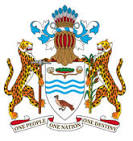Originally a Dutch colony in the 17th century, by 1815 Guyana had become a British possession. The abolition of slavery led to settlement of urban areas by former slaves and the importation of indentured servants from India to work the sugar plantations. The resulting ethnocultural divide has persisted and has led to turbulent politics. Guyana achieved independence from the UK in 1966, and since then it has been ruled mostly by socialist-oriented governments. In 1992, Cheddi JAGAN was elected president in what is considered the country's first free and fair election since independence. After his death five years later, his wife, Janet JAGAN, became president but resigned in 1999 due to poor health. Her successor, Bharrat JAGDEO, was reelected in 2001 and again in 2006. Early elections held in May 2015 resulted in the replacement of President Donald RAMOTAR by David GRANGER.
Guyana is a parliamentary republic.
Members:
Resources
Displaying 26 - 30 of 34Surveys (Special Provisions) Act (59:04).
The Act declares plans or diagrams based on surveys carried out by means of low altitude photography to the satisfaction of the Commissioner of Lands to have the same effect for all purposes as if it had been prepared under the Land Surveyors Act. (2 sections)
State Lands Act 1903 (Cap. 62:01).
The Act provides for the proper regulation of State lands, rivers and state creeks (preamble). The 45 sections are arranged as follows: Grants, leases and licences; Conditions and limitations; Forfeiture and determination of grant, licence or permission; General regulations; Regulations as to Rupununi cattle trail; Offences; Seizures; Mode of dealing with offenders; Right of entry; Savings; Procedure. The Minister may make further Regulations to implement this Act. Section 4 makes provision for the conversion of State Lands in Government Lands.
Acquisition of Lands (Not Beneficially Occupied) Act 1984 (Cap. 62:09).
This Act makes provision for the compulsory acquisition by the State of private land which results not to be beneficially occupied for a certain period of time so as to ensure rational use of such land. The Commissioner of Lands is empowered to enter upon lands to investigate whether parcel of land is beneficially occupied. The Minister may issue a notice to the owner of a land if he holds that such land is not beneficially occupied. The notice specifies a time limit and the manner in which that land shall be beneficially occupied.
State Lands Resumption Act (Cap. 62:02).
The Act provides for the resumption of Lands alienated by the State which are abandoned for eight or more years by the owners thereof and of which the owner cannot be ascertained (sect. 3).
Amerindian Lands Commission Act (59:03).
The Act provides for the establishment of a permanent government institution called the Amerindian Lands Commission.


